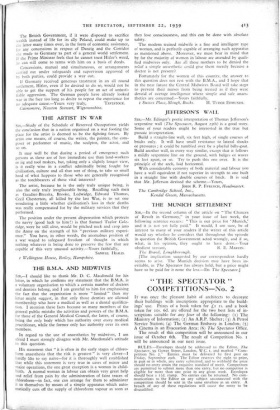THE PURPOSE OF THE WAR
Sm,—Public opinion seems already to have sorted itself into two camps. There are those who hold that our only task at the moment is to win the war and then, when we have rid the world of Iiitlerism, to consider what we are going to do with the peace: there are others who hold that it is necessary at once to work out in detail the kind of inter- national system which we propose to set up and to announce these aims with full official publicity.
My own allegiance is given unhesitatingly to the latter view. Indeed, I should hold that we should be fighting in vain if our purpose was merely to remove the German threat and then to re-establish the status quo. It seems clear that, apart from any sensational military or naval operations, the only way of bringing this war to a decisive conclusion and of avoiding a prolonged struggle in which both sides may be reduced to utter exhaustion, is by convincing the German people that our aims are their aims and that they must take action to ensure that they become our effective allies. It is of little use to tell them that we do not trust Hitler or that we are resolved to redress the unwarrantable aggression perpetrated against Poland. If our propaganda is to succeed we must present them with a programme which will benefit them as much as ourselves.
It must be a revolutionary programme, something which goes much farther than a revival of 1919 aspirations. We must convince the German people that not only do we call on them to change their political system and policy, but that we are equally determined to introduce changes which will build up a new world-order. In this context it would be impossible to suggest such a programme even in outline. All I am con- cerned here to do is to urge that without delay we should work out the full details of our scheme, should publish it to the world, and should announce that so soon as the German nation is willing to accept the principles of the scheme and to take the necessary steps for discussing it, we are ready to agree to an immediate cessation of hostilities. If we are to rally the Germans, the neutral nations, and ourselves to the cause of peace we must make clear not only what we are fighting against but what we are fighting for.—I am, Sir, &C.,
KENNETH INGRAM.
SIR,—In the midst of the present .war fever, and before the chances of peace grow even more remote, it might be well to bear in mind certain hopeful features of the situation which bold and constructive statesmanship could yet make use of to bring salvation out of darkening chaos.
Italy does not want war; France only wants it because sh, is afraid; Russia, who once made the boldest disarmarne: offer of any nation, is no longer unfriendly to Germany ; Japan, isolated and disappointed, if given generous econom.c help by richer Powers to relieve her very great natural poverty, could probably be induced to end the war in China
The British Government, if it were disposed to sacrifice wealth instead of life for its ally Poland, could make up to the latter many times over, in the form of economic assistance, for any concessions in respect of Danzig and the Corridor she made to Germany as part of a general world settlement. It the Prime Minister feels that he cannot trust Hitler's word, he can still come to terms with him on a basis of deeds.
Concessions, mutual and simultaneous, or arrangements carried out under safeguards and supervision approved of by both parties, could provide a way out.
If Germany received generous treatment in an all round settlement, Hitler, even if he desired to do so, would not be able to get the support of his people for an act of unjusti- fiable aggression. The German people have already looked war in the face too long to desire to repeat the experience for



































 Previous page
Previous page